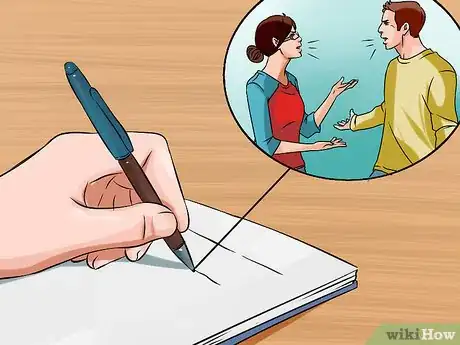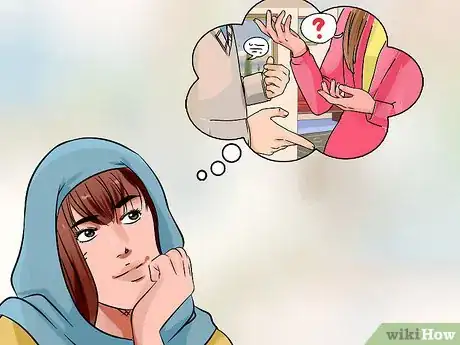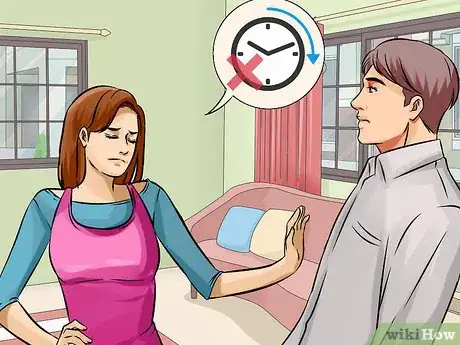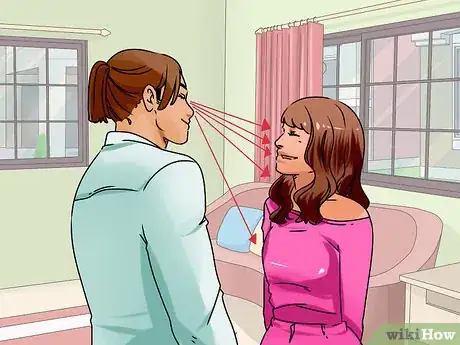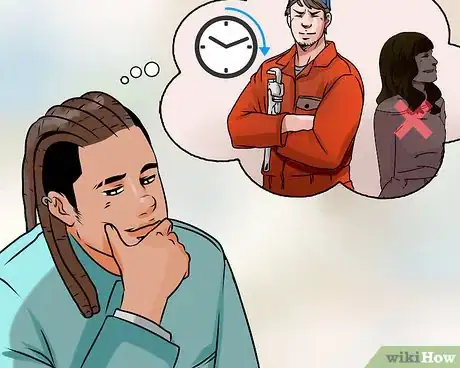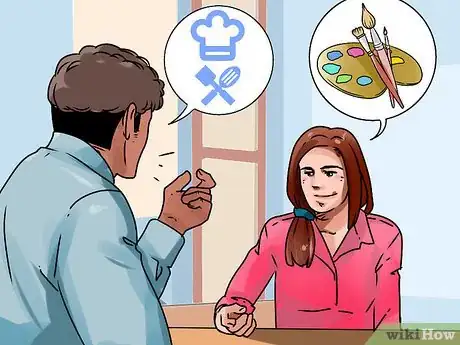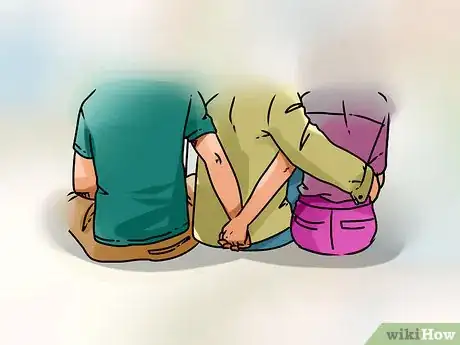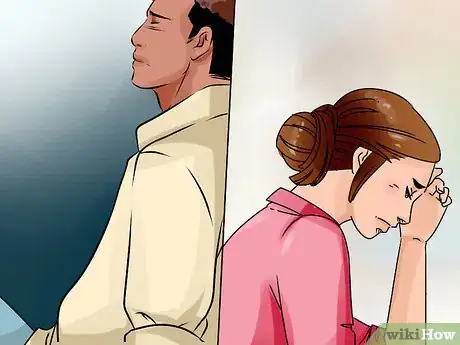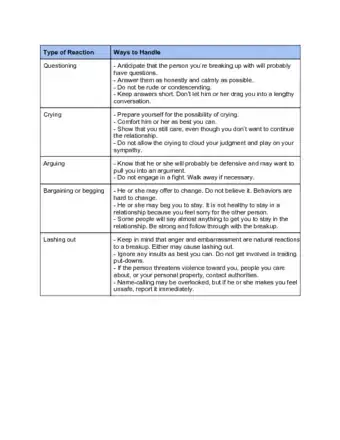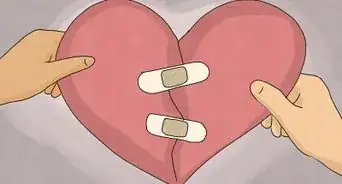This article was co-authored by Trudi Griffin, LPC, MS. Trudi Griffin is a Licensed Professional Counselor in Wisconsin specializing in Addictions and Mental Health. She provides therapy to people who struggle with addictions, mental health, and trauma in community health settings and private practice. She received her MS in Clinical Mental Health Counseling from Marquette University in 2011.
There are 12 references cited in this article, which can be found at the bottom of the page.
wikiHow marks an article as reader-approved once it receives enough positive feedback. In this case, 93% of readers who voted found the article helpful, earning it our reader-approved status.
This article has been viewed 922,026 times.
You have realized that your relationship isn't what it used to be. You've gone from having butterflies in your stomach to feeling dread when that someone walks in the door. It's tough to admit that your relationship might be over, but it is important to put an end to a dysfunctional and unhappy relationship. You might think your relationship is just going through a rough phase — and it might be — but there are key things that signal it is time to end to your relationship.
Steps
Reflecting on How You Communicate with Each Other
-
1Record how often you fight with your significant other. Fighting can be a healthy and productive way to communicate and resolve conflict. However, fighting incessantly and spending most of your time together engaged in fights may be a sign that your relationship is nearing its end.
- Picking fights over inconsequential things might be a cry for attention or a way to lash out, and could be a sign of the end.
- Leaving an argument feeling angry, resentful, bitter, and unwilling to make-up are signs that your relationship is failing.[1]
-
2Observe how frequently you discuss your feelings. An important cornerstone to relationships is communicating your own needs and feelings and understanding the needs and feelings of your partner.[2] If you feel like your significant other doesn't understand your feelings, and that you are unaware of how your partner is feeling, then your relationship is likely on the rocks.
- Failure to communicate can start small by simply not asking how each other's days went. But this can evolve into neglecting each other's feelings altogether.
- If you find yourself not listening to your partner or your partner not listening to you when you talk, then you are not effectively communicating, and trouble is near.[3]
Advertisement -
3Notice how you talk about the future together. Refusing to discuss what the future has in store for you and your partner may be an avoidance technique to deal with the fact that you cannot imagine being with your significant other for much longer. This may also mean that you cannot envision a future with your significant other in it, which is a sign that it may be time to let go.
- If you have never talked about getting married or if you want kids, then you might want to consider that this is not the person for you.
- If you've delayed responding to your friend's wedding invitation, planning a vacation together, or spending the holidays together because you don't know whether the relationship will last that long, then it may be time to end the relationship.
-
4Consider the level of verbal affection with your partner. Affectionate communication is an important cornerstone to the development and sustainment of a relationship. When verbal expressions of love cease, it might be a sign that you are unable to think of anything nice to say or you just do not want to say anything nice. The absence of verbal affection and communication is a red flag signaling the end of a relationship.[4] [5]
- Lack of complements, verbal “I love you’s,” and random love notes and text messages are all signs that the relationship is in trouble.
-
5Notice the way you talk about your partner to others. People in a healthy relationship are excited to share positive attributes or accomplishments of their partner with others. When you are speaking negatively about your partner when you are with friends, it is a sign of relationship distress. Speaking about your partner in a negative way shows a loss of respect and likely indicates larger issues in your relationship.[6]
- There's a difference between talking to a close friend about problems in your relationship and telling your friends that you're sick of or unhappy with your significant other. But if you are confiding in a close friend about your relationship woes frequently, it is time to end the relationship.
Reflecting on Your Thoughts and Feelings Towards Your Partner
-
1Acknowledge your level of excitement about your partner. Your partner used to give you butterflies in your stomach, but now you are just not that excited when they are around. If you're feeling constantly bored when you're with your significant other, or even bored at the thought of seeing or meeting up with them, then your heart may not be in the relationship.
- Your relationship is not going to be exciting at every minute. But you should feel some level of anticipation for them to come home at night or when you go out on a date with them.
-
2Assess your sexual attraction towards your partner. Physical attraction is important to both men and woman, especially in the first seven years of a relationship.[7] Your physical attraction is likely what first drew you two together. But if you find yourself ignoring or even feeling disgusted or repulsed by your partner, your relationship is not going for the long haul.
-
3Imagine your future without your partner. Picture all of your hopes and dreams for your future and see if your partner is standing beside you as you accomplish these dreams. Imagining a future that would be easier without your partner or one in which they are absent is a sign that your relationship is going to fail.
-
4Determine whether you still share common interests and goals. You might have had a lot in common when you first met, but you may be finding that you don't share the same goals, interests, or beliefs anymore. As your relationship has progressed, you have both grown into more mature individuals, and consequently, your ideals and goals may have grown apart. Take time to reassess whether you and your partner are on the same page and have similar goals.
- Conversations that are limited or unbearable or an inability to agree on professional goals and personal beliefs are signs that you do not share common goals in life any longer.
- Having your own independent goals and interest is perfectly healthy in a relationship. The trouble starts when your core values and beliefs begin to diverge and you cannot find anything you share.[8]
Assessing The Environment of Your Relationship
-
1Evaluate the frequency and passion of your sex life. If you've been in a dry spell for what feels like forever and don't even desire for sex, then it may be a sign of larger issues in your relationship.
- Try to remember when the last time you had sex, and if you did it just to check it off your to-do list, and whether or not your received satisfaction and pleasure from it. If it has been a while and is more of a task, then the relationship is not likely going to last.
- Visit a doctor to see if your low sex drive is due to hormonal imbalances from pregnancy or menopause or, if you are a man, if you are experiencing low testosterone.[9]
-
2Assess you and your partner’s faithfulness to each other. Infidelity can destroy a relationship because it shatters the trust and loyalty you have worked hard at obtaining. It is possible to survive infidelity, but if it becomes routine for one or both of you, then it is time to end the relationship.[10]
- Unless you have established that you have an open relationship, infidelity is difficult to overcome. When one or both of you is unfaithful on a routine basis, and it becomes almost expected and acceptable, then your relationship is likely over.
- Flirting is a form of infidelity, depending on your intent. If you flirt often because you are seeking affection or having dreams of being with that person, you are emotionally cheating on your partner, and you need to address why.[11]
-
3Investigate ways in which your partner is improving your life. Just as you should choose your friends wisely so you are surrounded with positivity, your relationship should uplift and improve your own life.[12] If you are feeling held back or burdened by your partner and they are not improving your life, you should strongly consider ending things.
-
4Recognize how often your friends and family choose to spend time with you and your partner. Your family and friends know you the best and want the best for you. If you recognize that they are avoiding spending time with you and your partner, your relationship is not meant to last. Having your network of support through your friends and family has a positive impact on the quality of your relationship.
- Family and friends often have high expectations for your partner or may have personality clashes with your partner. It is important to distinguish slight dislike from a bad impression with a genuine dislike and unwillingness to try to like your partner.
-
5Consider how much of your lives you are participating in together. Though it's important to maintain your independence even in a relationship, if your lives don't overlap at all, then you are in trouble. When you always hang out with your friends without your partner, are unaware of your partner’s daily life and routine, make weekend plans that do not include your significant other, or make no effort to include them in your plans, your relationship is on the brink of ending.
Additional Help
Warnings
- Once you realize your relationship is over, you should end it immediately. Though it will be painful, the sooner you do it, the better you'll feel, and the sooner you can move on.⧼thumbs_response⧽
- All the points in this article point to dysfunction in a troubled relationship, and if both partners are not willing to work on those issues together, then it's healthier to break it off sooner than later.⧼thumbs_response⧽
- If you know you should end your relationship but can't bring yourself to do it because you feel sorry for the person you're with, or don't think they could ever find anyone else, you're only prolonging the pain. You cannot predict the future of other people, and everyone is responsible for the way they carry out their life past the breakup.⧼thumbs_response⧽
References
- ↑ http://www.webmd.com/sex-relationships/features/how-to-stop-fighting-tips-for-married-couples
- ↑ https://www.betterhealth.vic.gov.au/health/healthyliving/relationships-and-communication
- ↑ http://www.psychalive.org/communication-between-couples/
- ↑ http://www.tandfonline.com/doi/abs/10.1080/01463379709370045
- ↑ Chapman, GD., Campbell, R. 2004. The 5 Love Languages: how to express heartfelt commitment to your mate. Northfield Printing.
- ↑ http://spr.sagepub.com/content/5/2/185.short
- ↑ http://www.huffingtonpost.com/vivian-diller-phd/physical-attraction-is-love-blind_b_1302550.html
- ↑ https://www.psychologytoday.com/blog/just-listen/200911/10-habits-happy-couples
- ↑ https://www.psychologytoday.com/blog/sex-sociability/201401/sexless-relationships
About This Article
Being unhappy in a relationship feels terrible, but you can know whether it’s just a phase or if it’s over by reflecting on your feelings and actions toward your partner. Take some time to think about how you and your partner communicate. If you fight often or rarely discuss your feelings, your relationship could be in a bad place. Additionally, take note whenever you talk about your future together, because avoiding those conversations could mean that you don’t see your relationship having a future. On a basic level, think about whether your partner excites you. If you don’t get excited when you spend time with them or don’t share common interests anymore, it’s likely over. For more help from our co-author, like how to evaluate your sex life, read on.
